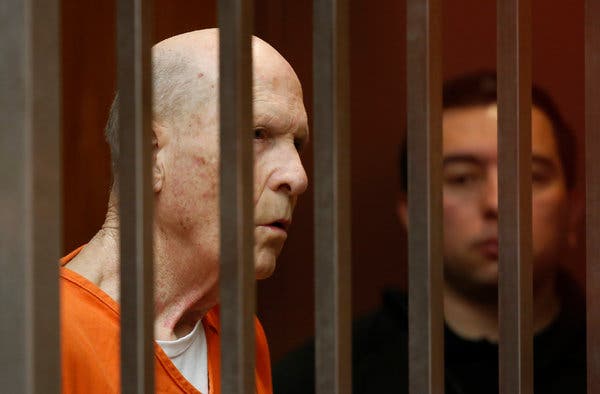The man accused of being the Golden State Killer, facing a possible death sentence for a series of rapes and murders that terrorized California in the 1970s and ’80s, has offered to plead guilty in exchange for a life sentence, court documents show.
The suspect, Joseph James DeAngelo, was arrested in a suburb of Sacramento in April 2018 with the help of a genealogy website. He was charged with 13 counts of murder as well as multiple kidnapping and weapons charges.
The investigation was the first high-profile case to be cracked with genetic genealogy, a forensic technique that relies on identifying crime-scene DNA with that of suspects’ cousins in genealogy databases. The people who submit DNA samples to these databases typically do so to research their family history. Many have been surprised to learn that their genetic profiles have been used to help solve crimes.
Mr. DeAngelo’s arrest inspired dozens of other agencies to begin solving violent crimes similarly, fundamentally revolutionizing how cases across the country are investigated. The technique has generated a backlash from some genealogists, legal scholars and privacy advocates who are concerned that the police and the F.B.I. are abusing these databases.
Last April, prosecutors announced that they would seek the death penalty if Mr. DeAngelo were convicted.
Gov. Gavin Newsom of California, a Democrat, announced a moratorium on executions in March 2019, but the death penalty remains legal in the state, and prosecutors have continued to seek death sentences.
In January, Mr. DeAngelo’s lawyers were hoping to “simply read and review the crushing” amount of information in the case when Sacramento County Superior Court, where he is being tried, entered not guilty pleas on his behalf. The pleas were entered “over counsel’s objections and against defendant’s desires,” Mr. DeAngelo’s public defenders, Joseph Cress and Alice Michel, wrote in a court motion this week.
“Mr. DeAngelo is 74 years old,” Mr. Cress and Ms. Michel wrote in a footnote. “He has offered to plead to the charges with a lifetime sentence.”
Mr. Cress declined to comment on Wednesday. But in a letter to victims’ families and survivors dated Feb. 25, Mr. Cress and Ms. Michel said that Mr. DeAngelo had offered to plead guilty because criminal cases often take years to resolve and the trial process is often very stressful for victims and their families.
“This particular case is exceedingly complex due to the number of charged crimes and the diverse locations of the charged crimes,” the lawyers wrote. “We would like to reach a resolution of the case that avoids a trial, satisfies all parties and provides a more immediate resolution of the case.”
The Sacramento County District Attorney’s Office responded on Wednesday by stating that “nothing has changed” since April 2019, when the office announced, along with district attorneys from several other California counties, that it would seek the death penalty for Mr. DeAngelo.
“We cannot add any further comment as this is a pending case,” said Shelly Orio, a spokeswoman for the district attorney’s office
Prosecutors have said that they wanted Mr. DeAngelo’s trial to bring an end to “probably the most notorious unsolved serial-rape killing in California history.”
The authorities have described the Golden State Killer as methodical and sadistic. He wore a ski mask, and usually wielded a gun. He tied up his victims, and issued threatening instructions through clenched teeth. He took mementos: photographs, jewelry, identification. He sometimes paused to eat or drink, as if to suggest he was perfectly at ease with violence.
His victims included women who were home alone and some who were home with their husbands. Sometimes, both husband and wife were killed. He is also thought to have burglarized more than 120 homes.
Although for years investigators had no suspect, they had long believed that one person was responsible for the string of murders because of DNA matches at the crime scenes. The breakthrough came after they created a fake profile with GEDmatch, an online genealogy database.
Investigators took a sample from the scene of a 1980 double murder in Ventura County and submitted it to GEDmatch. That led them to distant relatives of Mr. DeAngelo, and then to the man himself.
They searched Mr. DeAngelo’s trash and found a tissue with DNA that investigators said matched their crime-scene sample.
In April 2018, the authorities surprised Mr. DeAngelo at his home and took him into custody.
The rapid emergence of genetic genealogy over the past two years has been divisive. While many law enforcement agencies have celebrated the new tool, many genealogists and privacy advocates have been alarmed as detectives have used it to investigate increasingly minor crimes and in ways that violated the genealogy sites’ user agreements.
In Mr. DeAngelo’s case, many genealogists, lawyers and police departments have been eager to see how genetic genealogy would play out in court and whether the defense would present any kind of challenge to the technique. But any test of the method’s validity would be short-circuited if Mr. DeAngelo’s offer to plead guilty were accepted.
When Mr. Newsom halted executions in California last year, the state had more death row inmates than anywhere else in the Western Hemisphere. The last execution in the state was in 2006, when Clarence Ray Allen was put to death 23 years after his conviction for hiring someone to carry out three murders.













